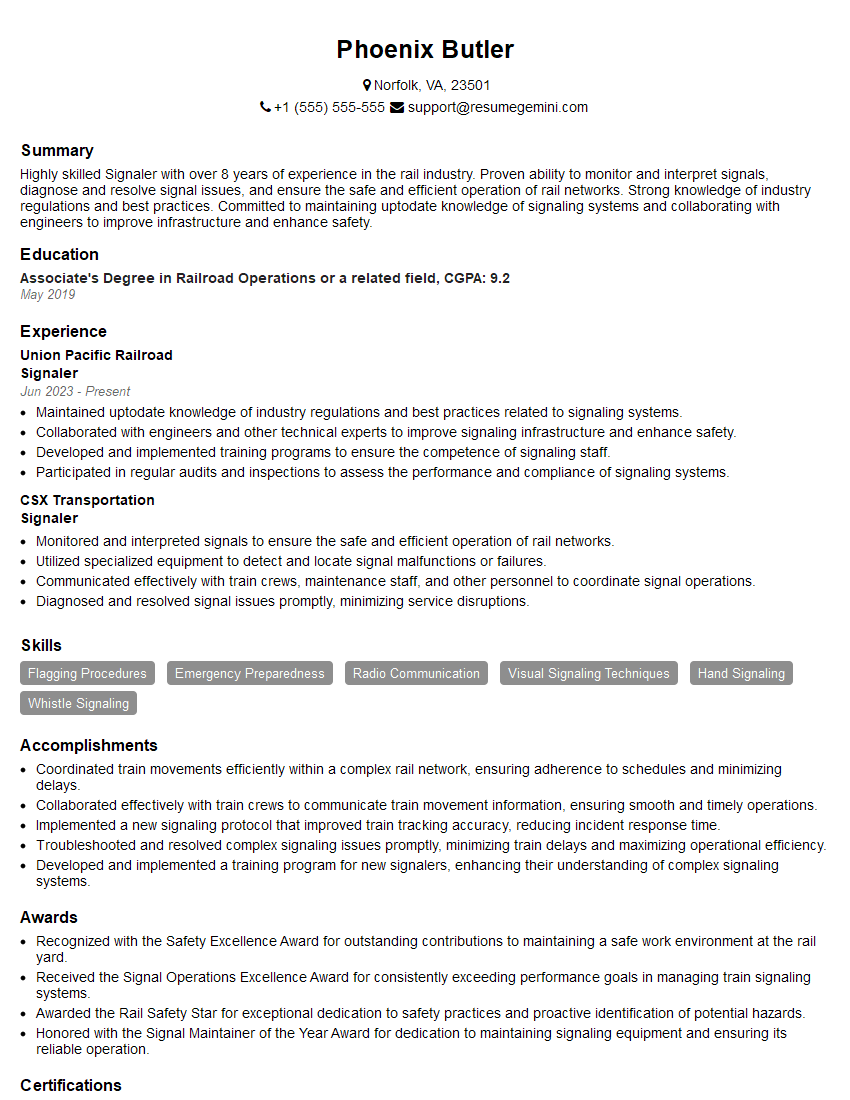Are you a seasoned Signaler seeking a new career path? Discover our professionally built Signaler Resume Template. This time-saving tool provides a solid foundation for your job search. Simply click “Edit Resume” to customize it with your unique experiences and achievements. Customize fonts and colors to match your personal style and increase your chances of landing your dream job. Explore more Resume Templates for additional options.

Phoenix Butler
Signaler
Summary
Highly skilled Signaler with over 8 years of experience in the rail industry. Proven ability to monitor and interpret signals, diagnose and resolve signal issues, and ensure the safe and efficient operation of rail networks. Strong knowledge of industry regulations and best practices. Committed to maintaining uptodate knowledge of signaling systems and collaborating with engineers to improve infrastructure and enhance safety.
Education
Associate’s Degree in Railroad Operations or a related field
May 2019
Skills
- Flagging Procedures
- Emergency Preparedness
- Radio Communication
- Visual Signaling Techniques
- Hand Signaling
- Whistle Signaling
Work Experience
Signaler
- Maintained uptodate knowledge of industry regulations and best practices related to signaling systems.
- Collaborated with engineers and other technical experts to improve signaling infrastructure and enhance safety.
- Developed and implemented training programs to ensure the competence of signaling staff.
- Participated in regular audits and inspections to assess the performance and compliance of signaling systems.
Signaler
- Monitored and interpreted signals to ensure the safe and efficient operation of rail networks.
- Utilized specialized equipment to detect and locate signal malfunctions or failures.
- Communicated effectively with train crews, maintenance staff, and other personnel to coordinate signal operations.
- Diagnosed and resolved signal issues promptly, minimizing service disruptions.
Accomplishments
- Coordinated train movements efficiently within a complex rail network, ensuring adherence to schedules and minimizing delays.
- Collaborated effectively with train crews to communicate train movement information, ensuring smooth and timely operations.
- Implemented a new signaling protocol that improved train tracking accuracy, reducing incident response time.
- Troubleshooted and resolved complex signaling issues promptly, minimizing train delays and maximizing operational efficiency.
- Developed and implemented a training program for new signalers, enhancing their understanding of complex signaling systems.
Awards
- Recognized with the Safety Excellence Award for outstanding contributions to maintaining a safe work environment at the rail yard.
- Received the Signal Operations Excellence Award for consistently exceeding performance goals in managing train signaling systems.
- Awarded the Rail Safety Star for exceptional dedication to safety practices and proactive identification of potential hazards.
- Honored with the Signal Maintainer of the Year Award for dedication to maintaining signaling equipment and ensuring its reliable operation.
Certificates
- Certified Signaling Technician (CST)
- Certified Railcar Inspector (CRI)
- OSHA Safety Certification
- First Aid and CPR Certification
Career Expert Tips:
- Select the ideal resume template to showcase your professional experience effectively.
- Master the art of resume writing to highlight your unique qualifications and achievements.
- Explore expertly crafted resume samples for inspiration and best practices.
- Build your best resume for free this new year with ResumeGemini. Enjoy exclusive discounts on ATS optimized resume templates.
How To Write Resume For Signaler
- Quantify your accomplishments with specific metrics and data whenever possible.
- Highlight your ability to work independently and as part of a team.
- Emphasize your experience with specific signaling systems and technologies.
- Tailor your resume to each job you apply for, highlighting the skills and experience most relevant to the position.
- Get feedback on your resume from a career counselor or professional resume writer.
Essential Experience Highlights for a Strong Signaler Resume
- Monitor and interpret signals to ensure the safe and efficient operation of rail networks.
- Utilize specialized equipment to detect and locate signal malfunctions or failures.
- Communicate effectively with train crews, maintenance staff, and other personnel to coordinate signal operations.
- Diagnose and resolve signal issues promptly, minimizing service disruptions.
- Maintain uptodate knowledge of industry regulations and best practices related to signaling systems.
- Collaborate with engineers and other technical experts to improve signaling infrastructure and enhance safety.
- Develop and implement training programs to ensure the competence of signaling staff.
Frequently Asked Questions (FAQ’s) For Signaler
What are the primary responsibilities of a Signaler?
Signalers are responsible for monitoring and interpreting signals to ensure the safe and efficient operation of rail networks. They also diagnose and resolve signal issues, communicate with train crews and other personnel, and maintain uptodate knowledge of industry regulations and best practices.
What are the educational requirements for becoming a Signaler?
Most Signalers have an Associate’s Degree in Railroad Operations or a related field. Some employers may also require Signalers to have experience working in the rail industry.
What are the career prospects for Signalers?
Signalers can advance to positions such as Signal Supervisor, Signal Engineer, or Train Dispatcher. They may also choose to specialize in a particular area of signaling, such as electrical signaling or computerbased signaling.
What are the challenges of working as a Signaler?
Signalers work in a fastpaced and demanding environment. They must be able to make quick decisions and work under pressure. They must also be able to work independently and as part of a team.
What are the benefits of working as a Signaler?
Signalers enjoy a variety of benefits, including good pay, job security, and opportunities for advancement. They also have the opportunity to work in a variety of settings, such as railroads, subways, and light rail systems.
How can I become a Signaler?
To become a Signaler, you will need to meet the educational and experience requirements for the position. You will also need to pass a background check and a drug test. Once you have met these requirements, you can apply for Signaler positions with railroads and other employers.